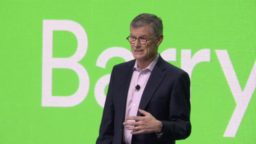Connected fitness firm Peloton announced a series of measures on Tuesday (February 8) as part of what it calls a ‘comprehensive restructuring program’ in the wake of a post-pandemic sales slump.
The firm’s co-founder John Foley is stepping down as CEO and will be replaced by Barry McCarthy, the former CFO of Spotify.
As CFO of Spotify, McCarthy was the mastermind behind the streaming company’s circumvention of a traditional initial public offering, instead pulling off a direct listing in 2018.
McCarthy stepped down from the position in 2020.
Additionally, Peloton is cutting 20% of its global workforce, which equates to 2,800 jobs.
In a letter to shareholders, Foley calls the layoffs a “meaningful reduction of our workforce, which will impact nearly all of our operations and across almost all levels”.
He added: “Decisions like these were not taken lightly, and we will work hard to assist impacted teammates with their transition.”
Foley, who is staying on as Executive Chair, issued a separate memo outlining the changes and noting that “impacted” employees in North America will be getting a 12-month Peloton subscription as part of their severance package.
Peloton’s restructuring comes amidst a lack of investor confidence due to diminished post-Covid lockdown demand for the company’s products.
As reported at the end of last month, Peloton has lost tens of billions in market cap value in the past year, with rumours circulating in January that Apple could be mulling a takeover bid.
In recent days, Amazon and Nike have both been reported to be considering swooping for the home fitness firm.
A reported Tuesday (February 8) Peloton generated total revenue of $1.13 billion in its fiscal Q2 2022 (calendar Q4 2021) ended December 31, growing 6% year- over-year.
Connected Fitness segment revenue, which includes the contribution from Precor, fell 8% year-over-year to $796.4 million, representing 70% of total revenue.
Peloton says that the decline reflected “fewer Connected Fitness unit sales against a very strong year-ago comparison”.

In Q2, Peloton’s Average Monthly Workouts per Connected Fitness Subscription were 15.5, below what it calls “the pandemic-aided 21.1 figure last year,” but representing 23% growth from engagement levels during Q2 2020.
The home-fitness market exploded during global Covid lockdowns in 2020 and Peloton quickly became a dominant name in the sector.
With music playing a central role in the connected fitness space, Peloton alone paid music rightsholders approximately $35 million across the course of 2020.
The firm continued to get increasingly close to, and receive much praise from, the music industry over the past two years, striking partnerships with Queen, Taylor Swift and the David Bowie estate.
Peloton also inked a deal with Beyoncé in 2020, which has since led to collaborative Peloton apparel drops carrying the star’s Ivy Park brand, and has even employed in-house DJs, John Michael and DJ Skribble, who have recently remixed tracks for the likes of Demi Lovato and Debbie Gibson to optimize them for user workouts.
Warner Music Group boss Cooper revealed in September 2021 that WMG had a run-rate of $235 million per year in revenue from “alternative offerings that create new use cases for music”.
Cooper notably called out “alternative” platforms like Facebook (which has “begun to utilize music in new and interesting ways over the last couple years”) as well as TikTok, Peloton and Roblox for their material contributions to that $235 million number.
In May 2021, Sony Music Group Chairman Rob Stringer revealed that across the three areas of social, gaming and fitness – via partnerships with the likes of Peloton, Fortnite etc. – Sony Music had generated nearly $400 million during the past fiscal year.
He added at the time that he expects these income streams to “become an even more material part of our revenue base”.
“I’m incredibly proud to have worked with such talented teammates over the years who have helped me build Peloton into what it is today, and I’m confident that Barry is the right leader to take the company into its next phase of growth.”
John Foley
Commenting on the leadership change, Foley said: “Since founding Peloton a decade ago, we’ve grown this brand to engage and motivate a loyal community of more than 6.6 million Members.
“I’m incredibly proud to have worked with such talented teammates over the years who have helped me build Peloton into what it is today, and I’m confident that Barry is the right leader to take the company into its next phase of growth.
“He’s not only recognized as an expert in running subscription business models and helping category-leading digital streaming companies flourish, but he has also had tremendous success in partnering with founder CEOs at other brands.
“I’m excited to learn from him and work alongside him as Executive Chair.”
“As a passionate Peloton Member, I have experienced firsthand this fantastic company’s mission and believe there is enormous potential for the platform.”
Barry McCarthy
McCarthy added: “As a passionate Peloton Member, I have experienced firsthand this fantastic company’s mission and believe there is enormous potential for the platform.
“I’m honored to join Peloton at such an important moment in the company’s history and look forward to working closely with John, the Board, and Peloton’s team members at all levels of the organization to execute against Peloton’s strategy and take the business to the next level.”Music Business Worldwide




